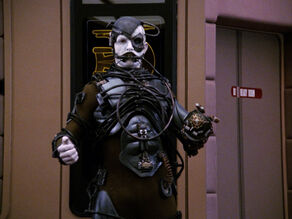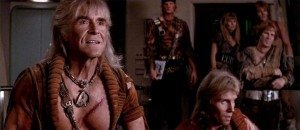One of the most popular explanations for enduring popularity of
Star Trek is that it is Utopian rather than Dystopian, and I agree.
Star Trek has a positive heroic vision of the future rather than a pessimistic
Road Warrior-Hunger Games point of view. However, when I was looking at pre Star Wars movies yesterday I was not overwhelmed by all the Dystopian Science Fiction movies preceding the Star Trek television series.
Attack of the Fifty Foot Woman and the
Incredible Shrinking Man weren't exactly Dystopian visions of the future. Like
Godzilla and
Them! they were examples of a Frankenstein's Monster type of plot line where man's creation destroys the creator. This is not to say that there weren't any Dystopian movies prior to Star Trek.
The Last Man on Earth (1964) starring Vincent Price was an early zombie-plague movie and before that there was a 1956 version of
1984 (Which I've been trying to get for the Library for years. It's just been reissued.). However neither of these movies made an especially big impact. In general 1950's and early 1960's Science Fiction movies tended to be alien invasion or mutant monster type of fun.
So if a Dystopian world view wasn't prominent in Sci-Fi movies before 1967 why would a positive Utopian series like Star Trek have such staying power. I think the answer is the 60's. The 1960's were a time of anti war protests, the Cold War, Civil Rights, and the beginning of the Environmental Movement. That's a lot of pessimism for one decade. Also Science Fiction Literature was steeped in Dystopian concepts. Two of the biggest classics of the Science Fiction genre are
A Brave New World and
1984 which are both the Dystopian world views all other Dystopian novels are compared to. They're not really Science Fiction movies but 1960's era produced
Doctor Strangelove,
Failsafe,
On the Beach, and the
Bedford Incident which were all cold war, 'if-we're-not-careful-we're-going-to-blow-up-the world' movies. There was a lot of angst in the 60's.
All literature, and Science Fiction is no exception, have some degree of social commentary. H. G. Wells
War of the Worlds was an allegory on Victorian Imperialism. It was a book that asked the question 'How would you feel if some super advance culture came along and stomped you?' That's one of the reasons I included all three of Charlton Heston's late 60's early 70's science fiction movies in my 'must-see' list from my last post. They were all Dystopian movies dripping with social commentary.
Planet of the Apes was an allegory on racism,
The Omega Man was commentary on the germ warfare and the military industrial complex, and
Soylent Green was a commentary on fear of man destroying the environment. Its not surprising that lots of Dystopian Science Fiction began showing up in the late 60's and 70's. George Lucas' 1971 film
THX 1138 is one of the most frightening visions of the future possible at least until the
Matrix franchise. But the number of Dystopian themed movies began increasing in the late 60's and 70's. Besides those movies already mentioned there were
Fahrenheit 451 (1966,)
A Clockwork Orange (1971)
Rollerball (1975)
a Boy and His Dog (1975) and
Mad Max (1979) so I'm not surprised that
Star Trek re-runs became popular in the 70's. I think people want a positive hopeful view of the future. I think that's why
Star Trek made a comeback and
Star Wars was such a huge hit.
(All movies mentioned in my articles are available at the Rogers Public Library, well
1984 will be as soon as I order it.)





